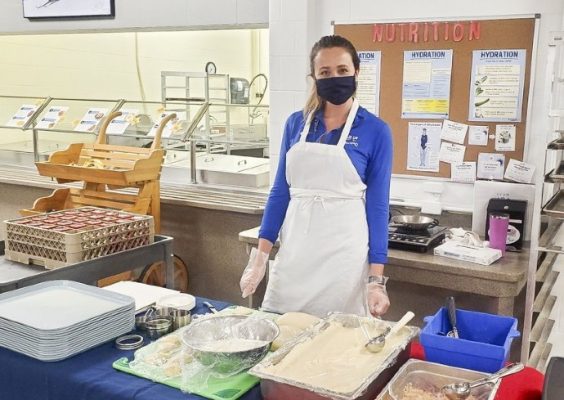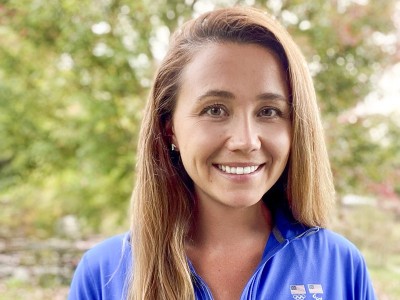At the peak of his Olympic swimming career, Michael Phelps, the most decorated Olympian of all time, was rumored to consume up to 12,000 calories daily during the 2008 Beijing Olympics.
That’s six times the number of calories the average person needs to consume daily.
All that food fueled Phelps to a record eight gold medals at the Summer Olympics. Phelps won gold in every event he participated in, the highlight of an Olympic career that saw Phelps win 23 gold medals and 28 total Olympic medals, both records for an Olympian.
As the 24th Winter Olympics continue in Beijing, many of us have been captivated by the incredible athletic feats of Nathan Chen (men’s figure skating gold medalist), Chloe Kim (women’s halfpipe gold medalist) and Erin Jackson (women’s 500-meter speedskating gold medalist).
Watching the world’s best Winter Olympians compete for gold, it’s only natural to wonder how these Olympians use food to fuel their bodies, and how we can eat like an Olympian.
The answer, according to Maggie McCrudden ’14, the food and nutrition registered dietitian for the U.S. Olympic and Paralympic Committee in Lake Placid, New York, is simple, and it doesn’t require consuming between 8,000 to 12,000 calories a day like Phelps did.
Olympians aren’t doing anything with their diet that the average person couldn’t do. Everyone can eat like an Olympian. — Maggie McCrudden ’14
“These Olympians and performance athletes use food as the fuel that helps them perform at their best, while the general person is not relying on their body to be in top peak performance shape day in and day out,” says McCrudden, who helps fuel Team USA’s elite athletes while providing nutrition education.

Maggie McCrudden in the kitchen preparing healthy dishes for Olympic hopefuls at the U.S. Olympic Training Center in Lake Placid, New York.
McCrudden knows what it takes to achieve athletic success. A captain and four-year member of the Orange women’s rowing team, McCrudden earned a bachelor’s degree in nutrition with a minor in gerontology from the Falk College of Sport and Human Dynamics.
McCrudden’s passion for blending nutrition with high-performing athletes blossomed following a summer internship with the New York Giants’ dietitian during the team’s annual rookie training camp. Leading up to her senior year at Syracuse University, McCrudden assisted with food demonstrations and nutrition education for rookies hoping to make the Giants roster.
Like those aspiring NFL players, McCrudden says Olympians excel in preparing their bodies for competition through their meal preparations and meal planning, their understanding of how food intake affects their ability to perform, and their commitment to consistently executing their food intake strategies while repeating those strategies daily.
LISTEN: Learn more about McCrudden’s journey from Syracuse University to Team USA’s official food and nutrition registered dietitian on the ’Cuse Conversations podcast.
Among her tips for people looking to improve their diets, improve how they feel and fuel their bodies like our Olympians:
- Avoid processed foods.
- Concentrate instead on natural, whole foods.
- Consume a variety of fruits and vegetables.
- Focus on whole grains and lean protein with every meal.
- Don’t forget to drink plenty of water to stay hydrated and allow your body to perform at its peak.
- Get plenty of sleep.
We all have food cravings—who doesn’t like a piece of chocolate cake or a salty snack like pretzels or potato chips?—but McCrudden says it’s important to give in to those cravings from time to time.

Maggie McCrudden, the food and nutrition registered dietitian for the U.S. Olympic and Paralympic Committee in Lake Placid, New York, helps Olympians rise to their potential through how they fuel their bodies.
“We don’t say no to food, so if you’re craving that piece of chocolate cake or that cookie, have it … in moderation. Eat it slowly, being mindful of how great it tastes while savoring each bite,” McCrudden says.
Here are a few other recommendations from McCrudden to take your dietary habits from couch potato to Olympian.
Starches: “Brown rice is great, as is jasmine rice and quinoa (high in protein). I also recommend whole grain or gluten-free bread.”
Lean Proteins: “Protein helps us feel full and helps our bodies recover. Eggs are great, you can take breakfast with you and it’s an easy from of protein. We always have hard-boiled eggs available at the training center. There’s also Greek yogurt, milk, black beans, chickpeas, tofu and tempeh. For meat, the way you cook the meat is more important. If you fry chicken you add in that fat, so we suggest baking, roasting, grilling or sautéing to reduce the amount of added fat. You need fat to absorb the nutrients, but the type of fat you consume is important. Adding oils, nuts and seeds (chia or flax) to a smoothie is a great way to add in a healthy serving of fat.”
Snacks: “In the morning, Greek yogurt will give you protein and carbohydrates, and you can add granola to a high-fiber cereal. String cheese is good, as is a piece of bread with peanut butter or almond butter as an after-workout snack. You must find balance with your snacks. Get something with protein, fat and carbohydrates to fill you up and help you recover. Hummus and carrots, any bean dip, smoothies, ants on a log (celery with peanut butter and raisins), turkey rollups with a piece of cheese, apples with peanut butter and low-fat cottage cheese are all great snack examples.”
Fruits/Vegetables: “Buy the fruit you like and have it readily available. The darker in color the fruit, the denser it is in nutrients. You should aim to eat a variety of fruits and vegetables, and in different colors, which will help you get a variety of vitamins and minerals. Berries are awesome, and tart cherry juice is high in antioxidants and helps with your recovery while fighting inflammation. As for vegetables, eat a wide variety. Dark greens like spinach, kale and broccoli are good for you and they taste great.”
"do it" - Google News
February 18, 2022 at 12:15AM
https://ift.tt/DmfikLq
'Everyone Can Do It': How to Eat Like an Olympian With Maggie McCrudden '14 - Syracuse University News
"do it" - Google News
https://ift.tt/t3vIG2H
https://ift.tt/kyns4Mc
Bagikan Berita Ini














0 Response to "'Everyone Can Do It': How to Eat Like an Olympian With Maggie McCrudden '14 - Syracuse University News"
Post a Comment